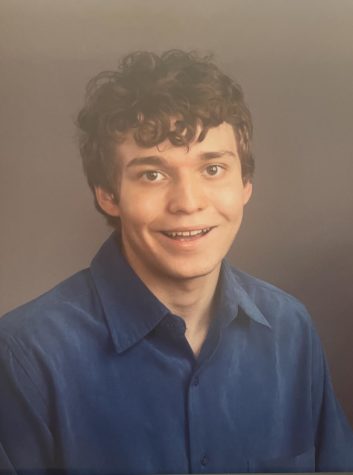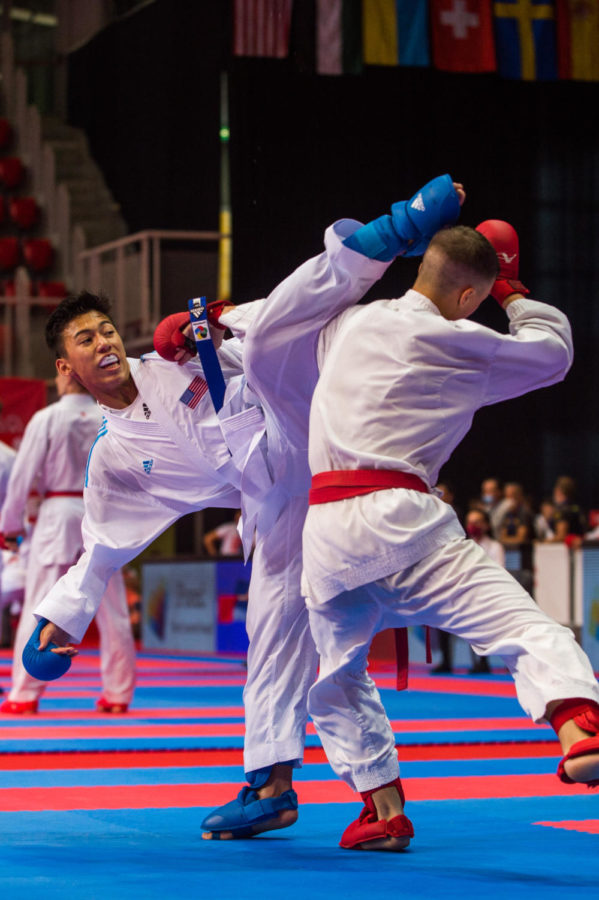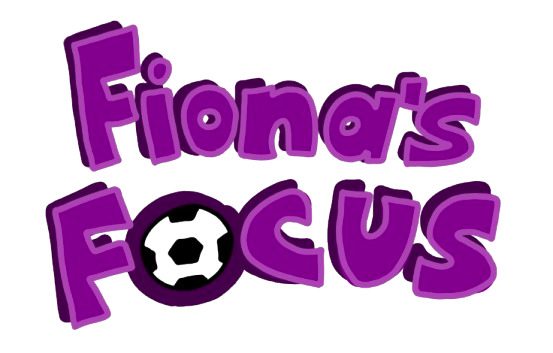Inside the world of junior national karate team member Mateo Solis
Image courtesy of Mateo Solis
Perhaps the greatest accomplishment of any ETHS athlete so far this school year came in early September when junior Mateo Solis won a silver medal at USA Karate Nationals. This finish not only guaranteed Solis a spot on the Junior National Karate Team, but also marked his first time on the team in three years.
“I mean, it’s just kind of an unimaginable feeling—having the US flag on my gi, being able to wear that warm up. It’s really hard to describe. A lot comes with it. You go around the tournament circuit, people know [of] you because you’re on the National Team. People root for you who you don’t even know. It’s really, really nice. It’s a really, really good feeling,” explains Solis.
According to Team USA, in karate, one must place top four at Nationals in their respective age group, weight class and discipline to qualify for the Junior National Team Pool. However, just the national champion and runner-up are guaranteed an opportunity to represent the USA at international competitions; third and fourth place finishers at Nationals only make the team as alternates. After Nationals, the top two finishers go on to compete at the Junior Pan American Championships, and the national champion at the Junior World Championships. Unfortunately for Solis, Pan American Championships did not occur this year due to COVID-19.
Last time Nationals was held in 2019, Solis ended up placing third in Elite Kata and fifth in Elite Kumite. Though undoubtedly a strong performance, since only the top two finishers at Nationals in each division are guaranteed spots on the Junior Team, Solis has been unable to represent Team USA since 2018.
And this wasn’t even the first time he bounced back like this.
In 2017, Solis placed fifth overall at the Junior Pan American Championships in Buenos Aires. The very next year, he came back and took home a silver medal from the 2018 version of that tournament, held in Rio De Janeiro. In fact, Solis came within striking distance of gold in 2018, and only settled for second place after being scored on in the last second of the championship match.
“That was a pretty big breakout,” says Solis of his 2018 Pan American Championships performance. “It pushed me to really go far.”
This past summer at the K1 Youth League in Poreč, Croatia, a tournament often regarded for its difficulty, Solis also took home a bronze medal, and from a global field of competitors. With this accomplishment, and perhaps for the first time, Solis cemented his name on the karate world stage.
Despite all of the success Solis has had in karate, as it turns out, his origin story with the sport is rather humble.
“I started when I was four because I watched the Karate Kid movies,” Solis tells. “I was really little, and I mean, it looked cool. I wanted to be like Daniel LaRusso.”
After becoming a three time member of the Junior National Team, competing in places as diverse as Brazil, Croatia and the Dominican Republic and even picking up a sponsorship from Adidas, Solis has learned one thing, if anything, from his experience with Karate.
“It turns out [Karate is] completely different from the movies.”
While the doors karate has unlocked for Solis are certainly eye-catching, the keys to them do not come without great sacrifice. Six days a week, sometimes twice a day, Solis trains.
“Usually, [karate] training sessions are an hour and a half, but I also supplement them with track sessions and weight sessions,” Solis describes. “As far as karate training—purely karate training goes—I train five to six times [a week], weight train twice a week and then [run] twice a week as well.”
During peak training, Solis practices two to two-and-a-half hours per day, five to six days a week, ten to twelve hours per week. While Solis is not in peak training year-round per se, since karate is a year round sport, this is his schedule most weeks out of the year.
“Karate athletes, we kind of pride ourselves on not having a season,” says Solis. “Certain months of the year are more packed than others as far as tournaments go, [but] there’s basically tournaments all year-round. You have to schedule which ones you’re going to go to,” Solis explains. “If I really, really wanted to, I could hit a tournament every month.”
With approximately a year and a half left of high school, Solis has thought long and hard about continuing karate as an adult. Post-graduation, Solis plans on attending college, which creates a bit of a tricky situation as karate is not officially recognized as an NCAA sport. Additionally, while karate was contested at the Olympics for the first time ever last summer, it will not be returning to the 2024 games in Paris. Ultimately, this has led Solis to make perhaps the most difficult decision he will ever have to.
“I mean, it’s kind of heartbreaking, but for now, I think I’m going to stop after high school,” states Solis. “It really depends on the college that I go to [though]. If it’s in a karate hotspot, I might keep going, but for now, the plan is to stop after high school.”
Like many high-achieving athletes, Solis has had to deal with feelings of burnout. While successes like his can often inspire feelings of jealousy in others, he wants people to know that he by no means has a perfect life. In fact, there are moments when he resents coming into practice, and feels so overwhelmed that he has to take time off.
“Some days I don’t want to come to training, and I have to and I hate it,” he says. “As recently as [mid-November], I had to take a break for, like, six days…It’s so many different emotions and it’s really hard to handle.”
Yet, Solis is able to kick and punch with such effortless grace that it is unlikely anyone would ever assume that. Nevertheless, he wants people to know that it’s true.
“I’ve been doing this for 13 years now and it’s just a rollercoaster,” he says. “There are times after you lose a tournament or after you lose a competition where you really think about ‘why are you in it?’ And then you go to another tournament where you win and it makes you feel really good.”
That being said, Solis is grateful for the possibilities karate has opened up for him, and wouldn’t trade his experiences for the world
“I have friends from all over the world. I’ve seen so many cities, people,” says Solis. “Very few people can say that they have traveled the globe doing something they love, and I’m just so grateful I am one of them,”
No matter what the future holds for Solis, what success he has had, will have or whether he continues fighting after high school, he believes that what karate has taught him, and not what it has brought him, is most important.
“I’ve realized it’s not about what karate brings me. You know, the flag, Team USA, whatever clout is associated with it—it’s not [about] that…How does this help me day to day? How is this building skills for me in the future? All of these things [are] why I really do it.”
Your donation will support the student journalists of the Evanstonian. We are planning a big trip to the Journalism Educators Association conference in Nashville in November 2025, and any support will go towards making that trip a reality. Contributions will appear as a charge from SNOSite. Donations are NOT tax-deductible.









Abdallah Alkodah • Feb 13, 2023 at 2:11 am
Keep up the good work Mateo ? ? I like your energy.
In the future try make balance between karate and college but never stop. I hope karate can be added into colleges and universities. Its a great sport. Its okay to take a break and do different things. Keep up with your training and learn new katas, kihons and go up with you black belt rank. Karate is not just kumite and it’s not all about competition. Best of luck champ ?
Lyan • Dec 17, 2021 at 11:34 am
Very well done i have a feeling most junior usa karate members think the same way. I know as I am part of that group that Mateo is in.